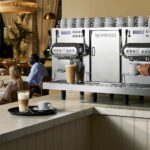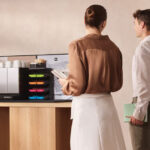For café owners and decision-makers in Canada, investing in a high-quality coffee machine can be one of the most cost-effective decisions you can make. Not only does it provide consistency and efficiency, but it also offers significant financial benefits, effectively equating to hiring a barista without the associated costs. Let’s delve into the figures to understand how a coffee machine can be a major money-saving tip for your café.

Cost of Hiring a Barista vs. Investing in a Coffee Machine
1. Barista Salaries and Benefits
– Average Salary: According to PayScale, the average hourly wage for a barista in Canada is approximately CAD 14.00. Assuming a full-time barista works 40 hours a week, this amounts to CAD 560 per week or about CAD 29,120 per year.
– Benefits and Overheads: Including benefits such as health insurance, paid leave, and other overheads, the cost can rise by 20-30%. This brings the total annual cost of employing a full-time barista to around CAD 37,856.
2. Initial Investment in a Coffee Machine
– High-Quality Coffee Machine: A high-end commercial coffee machine, such as a Nespresso Professional machine, typically costs between CAD 3,000 and CAD 7,000, depending on the model and features.
– Maintenance and Supplies: Annual maintenance costs and supplies (coffee pods, cleaning supplies) might add another CAD 1,500 to CAD 2,500.

Comparative Analysis: Barista vs. Coffee Machine
Initial and Annual Costs:
– First Year Costs:
– Barista: CAD 37,856
– Coffee Machine: CAD 7,000 (upper estimate) + CAD 2,500 (maintenance) = CAD 9,500
– Subsequent Year Costs:
– Barista: CAD 37,856
– Coffee Machine: CAD 2,500
Over the first year, the cost of a coffee machine is approximately 25% of the cost of employing a barista. In subsequent years, the coffee machine continues to save money, costing just 7% of the annual cost of a barista.

Operational Efficiency and Consistency
1. Operational Efficiency
– A coffee machine can operate continuously without breaks, ensuring that your café can serve coffee during peak hours without delays. This can increase sales and improve customer satisfaction.
– The speed and efficiency of a coffee machine mean shorter wait times for customers, leading to higher turnover and increased sales.
2. Consistency in Quality
– High-quality coffee machines ensure that each cup of coffee is brewed to perfection, maintaining consistent taste and quality. This consistency is vital for building a loyal customer base.
– Unlike human baristas, who might vary in skill and experience, a coffee machine guarantees the same quality every time, reducing the risk of customer complaints.

Additional Savings and Benefits
Training and Turnover Costs
– Training new baristas requires time and resources. With a coffee machine, the training required for staff is minimal, focusing primarily on operation and maintenance.
– Employee turnover is a common issue in the food service industry. Reducing dependency on human baristas minimizes the impact of turnover, saving on recruitment and training costs.
2. Energy and Resource Efficiency
– Modern coffee machines are designed to be energy-efficient, reducing operational costs over time. They also manage water usage effectively, contributing to overall resource savings.
Conclusion
Investing in a high-quality coffee machine offers a substantial financial advantage over hiring a full-time barista. The initial investment is a fraction of the cost, and the ongoing savings in salaries, benefits, and operational efficiencies make it a sound economic decision. Beyond the financial benefits, a coffee machine provides consistent quality and efficiency, enhancing customer satisfaction and driving repeat business. For Canadian café owners looking to optimize costs and improve service, a coffee machine is not just a smart investment—it’s a game-changer.




